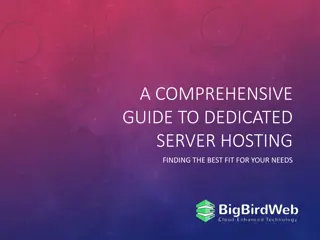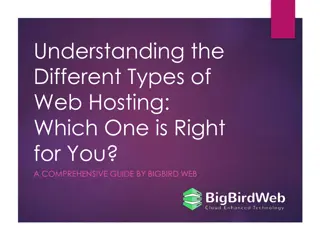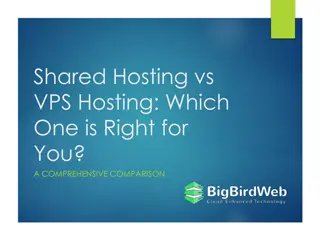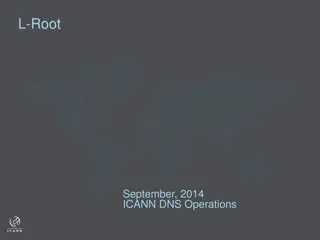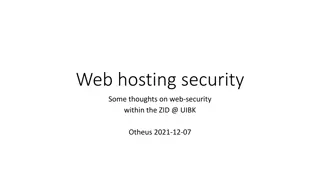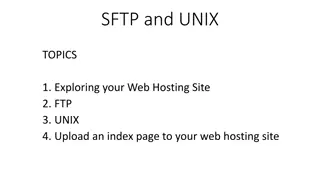
What is Web Hosting_ What are the best Web Hosting Services in 2024
Web hosting refers to the service that allows individuals and organizations to make their websites accessible via the Internet. It involves renting or buying space to house a website on the World Wide Web.
Download Presentation

Please find below an Image/Link to download the presentation.
The content on the website is provided AS IS for your information and personal use only. It may not be sold, licensed, or shared on other websites without obtaining consent from the author. If you encounter any issues during the download, it is possible that the publisher has removed the file from their server.
You are allowed to download the files provided on this website for personal or commercial use, subject to the condition that they are used lawfully. All files are the property of their respective owners.
The content on the website is provided AS IS for your information and personal use only. It may not be sold, licensed, or shared on other websites without obtaining consent from the author.
E N D
Presentation Transcript
What is Web Hosting? What are the best Web Hosting Services in 2024
Web hosting refers to the service that allows individuals and organizations to make their websites accessible via the Internet. It involves renting or buying space to house a website on the World Wide Web. Key components include: Servers: Physical or virtual computers where website data is stored. Domain Name: The website s address, such as www.example.com, which is used to access the website. Bandwidth: The amount of data that can be transferred from the server to users. Storage: The space provided on the server to store website files. Web hosting services come in various forms, each designed to cater to different needs and scales of operations. Web Hosting Services Web hosting Services allow organizations and individuals to post a website or web page onto the Internet. A web host, or web hosting service provider, provides the technologies and services needed for the website or webpage to be viewed on the Internet. Websites are hosted on special computers called servers. Key Components of Web Hosting: 1. Domain Name: The unique address used to access a website.
2. Server: The physical machine where the websites data is stored. 3. Bandwidth: The amount of data that can be transferred between the server and the users. 4. Storage: The amount of space available to store website files. Looking for affordable and reliable web hosting? Try Hostinger and enjoy top-notch performance at a great price. Click here to get started and take advantage of exclusive offers! How Web Hosting Works Web hosting functions by storing website files on servers, and making them accessible via the internet. Key components include: 1. Web Server: A computer that hosts websites. 2. Domain Name: A user-friendly address linking to the server. 3. File Storage: Space for HTML, images, scripts, and more. 4. Bandwidth: Controls data transfer rates to and from users. 5. FTP/SFTP: Protocols to upload files to the server. 6. Control Panel: An interface for managing hosting settings. 7. Backup and Security: Protects data integrity and privacy. This infrastructure ensures seamless access to hosted websites worldwide.
Types of Web Hosting Services Shared Hosting Shared hosting involves multiple websites sharing a single server s resources. It is cost-effective and suitable for small to medium-sized websites with moderate traffic. Virtual Private Server (VPS) Hosting VPS hosting provides a virtualized server that mimics a dedicated server s environment. It offers more control and scalability compared to shared hosting, ideal for growing websites. Dedicated Hosting Dedicated hosting grants exclusive access to an entire server. This option offers maximum performance, control, and security, making it suitable for large websites with high traffic volumes. Cloud Hosting Cloud hosting utilizes a network of virtual servers to host websites. It provides scalability, flexibility, and reliability, accommodating varying traffic levels and resource demands efficiently.
Managed Hosting Managed hosting includes technical services like server maintenance, updates, and support. It is ideal for users needing expert assistance and minimal hands-on server management. WordPress Hosting WordPress hosting is specifically tailored for WordPress websites. It offers optimized performance, security, and management features, ensuring an optimal environment for WordPress sites. Reseller Hosting Reseller hosting allows individuals or businesses to resell hosting services. It includes tools and resources to manage multiple client accounts, ideal for web developers and agencies. Looking for affordable and reliable web hosting? Try Hostinger and enjoy top-notch performance at a great price. Click here to get started and take advantage of exclusive offers! Shared Hosting: Pros and Cons
Shared hosting is a popular option for many websites due to its affordability and ease of use. Here are some advantages and disadvantages of shared hosting: Pros Cost-Effective: Shared hosting plans are usually the most affordable option, making them ideal for small businesses and personal websites. Ease of Use: Providers often offer user-friendly interfaces and control panels, simplifying website management. Maintenance: The hosting provider handles server maintenance and management, reducing the technical workload on users. Cons Limited Resources: Users share server resources, which can lead to slower performance, especially during peak traffic times. Security Risks: Sharing a server with multiple sites increases the risk of security vulnerabilities. Less Control: Limited ability to customize server settings to meet specific needs. VPS Hosting: Why It Might Be Right for You
Virtual Private Server (VPS) hosting offers an optimal blend of performance and affordability. It suits users needing more control and resources than shared hosting provides. Key Benefits 1. Scalability: Easily scale resources up or down based on demand. 2. Control: Root access for software installations, configurations, and customizations. 3. Performance: Better speed and uptime compared to shared hosting. 4. Security: Enhanced security features, including isolated environments. 5. Cost-Effective: More affordable than dedicated servers, offering a balance of cost and functionality. VPS hosting is ideal for growing websites and applications needing robustness and flexibility. Dedicated Hosting: Features and Benefits Dedicated hosting provides a single client with an entire server s resources.
Key Features Performance: Ensures optimal load times and maximum performance. Control: Full root access allows customization of server settings. Security: Enhanced protection with isolated resources. Reliability: Dedicated resources result in higher uptime. Benefits Scalability: Easily scales to handle growing demands. Support: Premium 24/7 technical support for troubleshooting. Compliance: Meets industry-standard compliance requirements. Customization: Ability to run custom software and applications. Cloud Hosting: The Future of Web Hosting Cloud hosting offers unparalleled flexibility, scalability, and reliability compared to traditional hosting methods. Scalability: Easily handle traffic spikes with automatic resource allocation. Cost-Effectiveness: Pay-as-you-go models reduce overhead costs, making it ideal for startups. Performance: Faster load times and consistent performance, supported by multiple servers.
Security: Enhanced security features protect data and ensure compliance with regulations. Management: Simplified administration with advanced control panels and monitoring tools. Companies such as Amazon Web Services (AWS), Google Cloud Platform (GCP), and Microsoft Azure lead the industry with robust cloud hosting solutions. Cloud hosting is imperative for modern businesses seeking high performance and reliability. Managed vs. Unmanaged Web Hosting Managed web hosting offers users server management, maintenance, and support by the hosting provider. Features often include automated backups, software updates, and security. It is ideal for businesses lacking technical expertise.
Unmanaged web hosting places server control and maintenance entirely in the hands of the user. This option provides greater flexibility and cost savings but requires technical knowledge to handle server configurations, updates, and troubleshooting. Benefits of Managed Hosting Automatic updates Enhanced security Regular backups Expert support Benefits of Unmanaged Hosting Lower cost Greater control Custom configurations Scalability Web Hosting Pricing: What to Expect Web hosting pricing can vary greatly depending on the type and features offered. Key factors influencing cost include server type, bandwidth, and support.
Shared Hosting: Least expensive, ranging from $2 to $10 per month. Suitable for small websites with low traffic. VPS Hosting: Pricing starts at $20 monthly. Offers more control and better performance than shared hosting. Dedicated Hosting: Costs range from $80 to $300+ monthly. Ideal for large-scale websites requiring maximum resources. Cloud Hosting: Flexible pricing based on usage, generally starting around $10 per month. Additional costs may include domain registration, SSL certificates, and backup services. Key Features to Look for in a Web Hosting Provider Choosing the right web hosting provider is crucial for website performance. Key features to consider include:
Uptime Guarantee: Look for providers with a minimum of 99.9% uptime guarantee. Speed and Performance: High-performance servers with SSD storage enhance load times. Customer Support: 24/7 customer support through multiple channels is essential. Security Features: Ensure robust security measures like SSL certificates, DDoS protection, and regular backups. Scalability Options: Flexibility to upgrade plans as your website grows. User-friendly Control Panel: An intuitive control panel like cPanel or Plesk is beneficial. Cost and Value: Competitive pricing with a clear understanding of renewal rates. Looking for affordable and reliable web hosting? Try Hostinger and enjoy top-notch performance at a great price. Click here to get started and take advantage of exclusive offers! The Importance of Server Uptime and Reliability
Server uptime refers to the amount of time a server remains operational and accessible. High server uptime is crucial for maintaining the availability of websites. When a server experiences downtime, visitors cannot access the site, leading to lost traffic and revenue. Reliability ensures that a server consistently performs well under various conditions. Key Benefits: Improved User Experience: Constant availability prevents user frustration caused by inaccessible websites. SEO Benefits: Search engines favor websites with higher uptime, directly influencing search rankings. Business Credibility: Demonstrates professionalism, bolstering user trust in the brand or service. Reduced Maintenance Costs: Fewer downtimes lead to lower repair and recovery expenses. Customer Support: Why It Matters A reliable customer support system is crucial for web hosting services. Prompt assistance can prevent significant downtime and data loss. Key elements to consider include: Availability: Round-the-clock support ensures issues are resolved anytime.
Technical Expertise: Knowledgeable staff can address complex problems efficiently. Response Time: Faster response times reduce waiting and ensure quicker resolutions. Communication Channels: Multiple channels, such as live chat, phone, and email, offer more choices for assistance. Effective customer support enhances user experience, maintains website uptime, and builds trust in the service. Security Features to Seek in Web Hosting When selecting a web hosting provider, evaluating security features is crucial to protecting sensitive data and maintaining website integrity. Essential security features include: SSL Certificates: Ensure data encryption between browsers and servers. Firewall Protection: Guards against unauthorized access and cyber attacks. DDoS Protection: Shields the site from distributed denial-of-service attacks. Malware Scanning and Removal: Regularly scans for and eliminates malicious software.
Automatic Backups: Provides data restoration in case of loss or corruption. Secure FTP (SFTP): Ensures secure file transfer via encrypted protocols. Login Security & Monitoring: Implements multi-factor authentication and monitors login activities. Evaluating Scalability Options Scalability is crucial for handling increased traffic and growth. When evaluating scalability options, consider the following: Vertical Scaling: Enhancing the existing server s capacity by adding more CPU, RAM, or storage. Horizontal Scaling: Adding more servers to distribute the load. Cloud Hosting: Offers flexible resources that can be scaled on-demand. CDN Integration: Speeds up content delivery by using a network of servers globally. Load Balancers: Distributes incoming traffic across multiple servers to optimize resource use and avoid overload. Additionally, consider uptime guarantees, automated backups, and resource monitoring tools provided by web hosting services. Effective scalability ensures seamless growth and robust performance.
User Reviews and Reputation When evaluating web hosting providers, user reviews and a company s reputation play crucial roles. 1. Customer Feedback: Users often share experiences on forums and review sites. Look for consistent praise or complaints. 2. Industry Reputation: Reputable companies have long-standing industry presence. Check awards and recognitions received. 3. Support Quality: Users highlight the responsiveness of customer service. Note 24/7 support and problem resolution times. 4. Uptime Records: User testimonials about server reliability are critical. High uptime percentages indicate dependability. 5. Pricing Transparency: Customers appreciate honesty in pricing. Beware of hidden fees reported by users.
The Best Web Hosting Services in 2024 Web hosting is fundamental for maintaining an online presence. Here are the top web hosting for 2024: Hostinger Hostinger is a web hosting provider known for offering affordable, fast, and reliable hosting services. Established in 2004, the company has grown to serve millions of customers worldwide. Hostinger offers a wide range of services including: 1. Shared Hosting: Affordable plans that allow multiple websites to share the same server resources. 2. Cloud Hosting: Offers scalable and high-performance hosting using cloud technology. 3. VPS Hosting: Virtual Private Servers (VPS) for more advanced users who need dedicated resources. 4. WordPress Hosting: Optimized hosting plans for WordPress users with enhanced performance features. 5. Domain Registration: Register and manage domains directly through Hostinger.
6. Website Builder: A drag-and-drop builder that helps users create websites without needing technical skills. Hostinger is well-regarded for its customer support, speed, and low-cost plans, making it a popular choice for beginners and small businesses looking to build a strong online presence. Looking for affordable and reliable web hosting? Try Hostinger and enjoy top-notch performance at a great price. Click here to get started and take advantage of exclusive offers! HostGator HostGator remains a popular choice in the web hosting industry due to its feature-rich packages and competitive pricing. Key Features: Uptime Guarantee: 99.9% uptime ensures reliable performance. Customer Support: 24/7/365 support through live chat, phone, and email. Pricing Plans: 1. Hatchling Plan: Single domain. $2.75/month. 2. Baby Plan: Unlimited domains. $3.95/month. 3. Business Plan: Advanced features. $5.95/month. Advantages: Free Website Builder: Easy site creation. Unmetered Bandwidth: No hidden data limits. Flexible Billing: Monthly to triennial options.
Considerations: Renewal Prices: Higher than introductory rates. No Free Domain: Unlike some competitors. HostGator provides robust hosting solutions suitable for various needs. Bluehost: Strengths and Weaknesses Strengths User-Friendly Interface: Bluehost offers an intuitive control panel, making it accessible for beginners. Performance: Reliable uptime and fast loading speeds, ensuring a seamless user experience. Customer Support: 24/7 customer support via phone, chat, and email. WordPress Integration: Recommended by WordPress.org, providing seamless WordPress installations. Free Domain: Includes a free domain for the first year with hosting plans. Weaknesses Renewal Pricing: Significant price increases upon renewal compared to initial terms.
Limited Backup Options: Basic backup features may require purchasing additional services. Resource Restrictions: Lower-tier plans have limitations on storage and bandwidth. Additional Fees: Costs for addons and extra services can accumulate quickly. SiteGround: Performance Overview SiteGround is renowned for exceptional performance in the web hosting industry. Key features contributing to its high performance include: Speed Optimization: Utilizes SSD storage, NGINX servers, and PHP 7 for faster loading times. Uptime: Impressive 99.99% uptime, ensuring nearly zero downtime for websites. Data Centers: Strategically located data centers across North America, Europe, Asia, and Australia offer high redundancy. Content Delivery Network (CDN): Free Cloudflare CDN integration for enhanced global content delivery. Caching Mechanisms: SuperCacher technology for improved web page speed and efficiency. Resource Allocation: Auto-scaling capability to manage traffic spikes without affecting performance.
By focusing on these aspects, SiteGround provides reliable and swift hosting for various web needs. A2 Hosting: Speed and Reliability A2 Hosting stands out for its fast performance and consistent reliability. It deploys numerous technologies to achieve optimal speeds and uptime. Turbo Servers: These servers provide up to 20 times faster page loads, enhancing the user experience. NVMe Storage: Non-Volatile Memory Express (NVMe) drives ensure rapid data access and better overall performance. 99.9% Uptime Guarantee: A2 Hosting ensures websites are almost always up and running, minimizing downtime. Anytime Money-Back Guarantee: Reflects the confidence in their services, offering refunds if customers are dissatisfied. 24/7/365 Support: Reliable customer service available round the clock to resolve issues quickly.
InMotion Hosting: A Detailed Look InMotion Hosting stands out for its reliability and robust performance. They offer diverse plans catering to different needs, from shared hosting to dedicated servers. Performance: Noted for high uptime rates and speed optimization. Customer Support: 24/7 customer service with extensive online resources. Features: Free SSL Certificates Free Domain for the first year Unlimited Email Accounts One-click installer for popular applications Pricing: Competitive pricing with a 90-day money-back guarantee. User Interface: cPanel-based, ensuring easy management of hosting services.
WP Engine: Best for WordPress Sites WP Engine specializes in managed WordPress hosting, offering robust features tailored to optimize and secure WordPress sites. Users benefit from: High Performance: WP Engine leverages EverCache technology and global CDNs to ensure fast load times. Security: Automated daily backups, malware scanning, and a dedicated security team provide comprehensive protection. Scalability: The platform offers scalable architecture, making it ideal for sites experiencing high traffic. Customer Support: 24/7 expert support is available for troubleshooting and guidance. Developer Tools: Advanced tools, including staging environments and Git integration, facilitate streamlined development.
GreenGeeks: Eco-Friendly Web Hosting GreenGeeks sets itself apart with a commitment to green energy, ensuring that web hosting is environmentally sustainable. They promise reliability with 99.9% uptime and 24/7 customer support. Their hosting plans include: Shared Hosting: Ideal for small websites and beginners. VPS Hosting: Suitable for growing websites requiring more control and power. Dedicated Servers: For large websites needing complete server resources. They purchase wind energy credits to counterbalance energy use, making them carbon-reducing. GreenGeeks also offers unlimited SSD web space, ensuring faster site access and better performance.
Comparing Costs: Budget vs. Premium Hosting When comparing budget and premium hosting, several factors come into play: Price: Budget hosting generally costs less, often under $10 per month. Premium hosting can range from $20 to $300+ monthly. Performance: Budget options may offer limited bandwidth and slower speeds. Premium hosting provides faster load times and higher uptime percentages. Features: Budget plans may lack advanced features like automated backups or CDN integration. Premium services typically include robust security, backups, and 24/7 support. Scalability: Budget hosting may struggle with traffic spikes.
Premium options are scalable, handling increasing traffic seamlessly. Choosing the Right Web Host for Your Needs Selecting the perfect web host requires careful consideration of several factors. Key elements to evaluate include: 1. Performance and Speed: Opt for hosts with high server uptime and fast loading times. 2. Security Features: Look for SSL certificates, DDoS protection, and regular backups. 3. Scalability: Choose a host that can grow with your website needs. 4. Customer Support: 24/7 support is essential for troubleshooting issues. 5. Pricing Plans: Compare costs and features to find the best value. 6. User Reviews: Research feedback from other users to gauge reliability.
Looking for affordable and reliable web hosting? Try Hostinger and enjoy top-notch performance at a great price. Click here to get started and take advantage of exclusive offers! Future Trends in Web Hosting Web hosting is witnessing significant innovations and advancements. Key trends redefining the industry include: Cloud Hosting: Increased adoption due to scalability and reliability. Green Hosting: Eco-friendly solutions to reduce carbon footprints. Edge Computing: Enhancing performance by processing data closer to the user. AI and Automation: Improving customer support and server management. Security Enhancements: Advanced measures against cyber threats. Blockchain Technology: Providing decentralized and secure hosting solutions. Managed Hosting: Growing preference for comprehensive management services. Future trends in web hosting illustrate a shift towards more efficient, secure, and sustainable solutions, driven by emerging technologies and evolving user expectations.
Final Recommendations A thorough understanding of web hosting is fundamental. Choosing the right web hosting provider involves evaluating various factors. Users should consider the following: Pricing Plans: Assess multiple plans to find cost-effective solutions. Performance and Uptime: Prioritize providers with at least 99.9% uptime. Customer Support: 24/7 support is crucial for resolving issues promptly. Scalability: The provider should accommodate growing traffic. Security Features: Look for features like SSL certificates and regular backups. Reviews and Reputation: Investigate user reviews and industry reputation. Looking for affordable and reliable web hosting? Try Hostinger and enjoy top-notch performance at a great price. Click here to get started and take advantage of exclusive offers!





